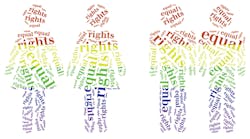National Gay Anti-Discrimination Law Seen Inevitable, Courtesy of a Clash of Federal Courts
Employers should prepare for the extension of federal civil rights law to prohibit gay discrimination, warn employment law experts in the wake of recent appeals court decisions.
These cases have gone virtually unnoticed in the midst of the raucous media three-ring circus surrounding transgender issues. But suits involving charges of employment discrimination will create concerns and costs that can easily outstrip sorting out which bathrooms your employees can use.
Until earlier this year, federal appeals courts have rebuffed arguments that the sex discrimination provision of national civil rights law, called Chapter VII, extends beyond gender to protect sexual orientation. All that changed when a Seventh Circuit U.S. Court of Appeals decision handed down on April 4 said it does.
The story begins with a lawsuit brought by Indiana college instructor Kimberley Hively, who claims that in her 14 years at her school she was passed over for promotion numerous times because she was a lesbian. A lower court dismissed the case saying Title VII didn't apply. A three-judge panel of the Seventh Circuit Appeals Court agreed on a 2-1 vote. Hively's lawyers then asked for a full court review, resulting in an 8-3 decision in her favor.
Similar cases have fared less well in other courts. Three-judge panels in the Second and Eleventh Circuit Appeals Courts declined to extend Title VII protections to include sexual orientation. However, both decisions have been appealed to their respective full courts. As a result, it's possible that the Seventh Circuit ruling will be followed by similar Appeals Court decisions and may end up under review by the Supreme Court.
Why Employers Need to Act
Although other courts do keep an eye on decisions like this one, the Seventh Circuit ruling only applies to the three states within its jurisdiction. Of those, Illinois and Wisconsin already have gay rights laws while Indiana does not. Congress may have failed to pass gay rights legislation, but many states and localities have.
In a concurring opinion, Judge Richard Posner cited that fact when he admitted that the Title VII definition of "sex" discrimination really does not apply to sexual orientation. But, he said, the statute needs an "interpretation that will update it to the present."
The Seventh Circuit majority pointed out that even where state and local laws don't deal with sexual orientation protection, many employers have adopted such policies in order to conform to human resources best practices and evolving societal norms.
"These steps are now more important than ever" for employers, says attorney Neal D. Mollen of the law firm of Paul Hastings LLP. "The visibility of Hively may well result in more complaints of sexual orientation discrimination. Employers should ensure that managers are attuned to their responsibilities in this regard."
Federal contractors are already required to halt any discrimination or harassment based on sexual orientation or gender identity, a requirement that applies to 24,000 companies and 28 million workers. Earlier this year President Trump signed an executive order continuing this policy, which was originally adopted by President Obama last year.
"Even in jurisdictions that have no such legislation in place, we recommend that employers prohibit such discrimination or harassment as a matter of company policy," notes Robin Shea, partner with the law firm of Constangy, Brooks, Smith & Prophete "We also recommend that it be included in companies' regular equal employment and sexual harassment training."
One of the ironies of the Hively case is that while it may eventually lead to a landmark Supreme Court decision, she could still lose her case on its merits once it is returned to the lower court, which had dismissed it before it could proceed to trial.






